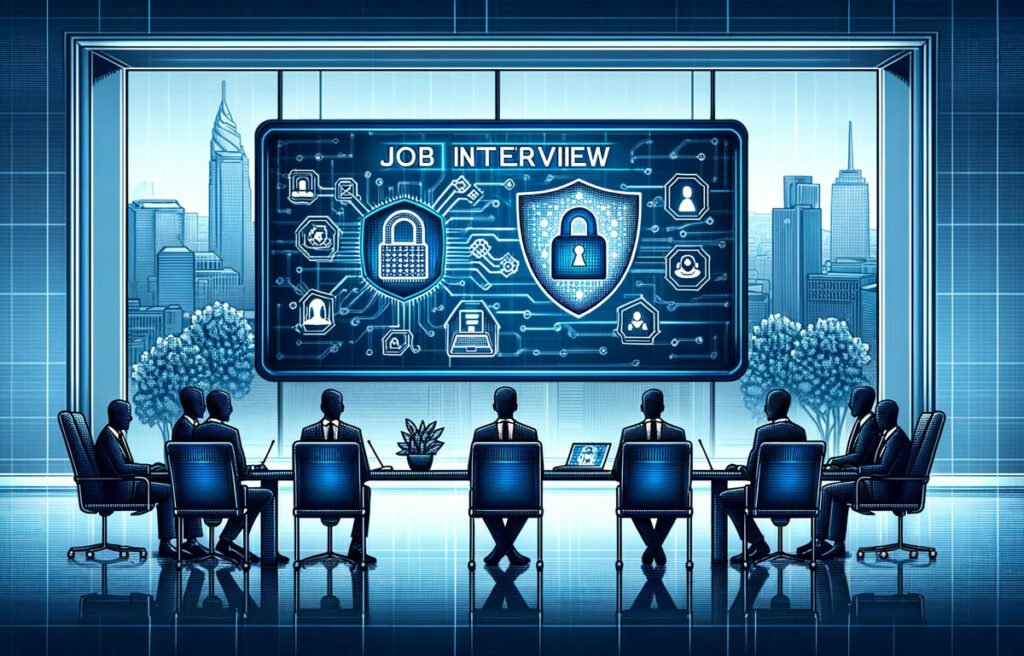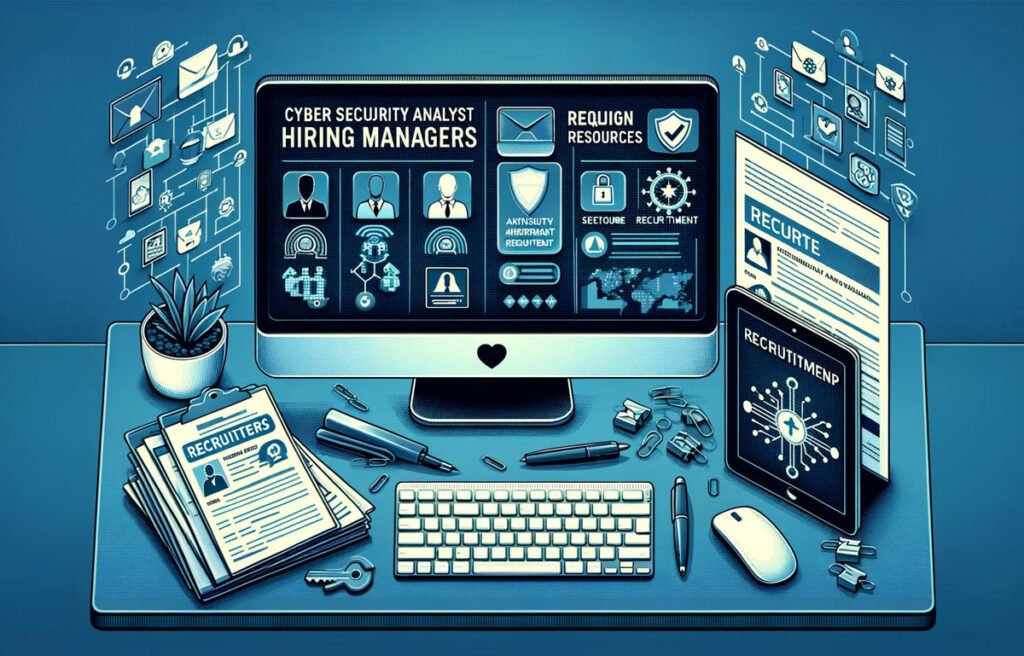Introduction to this Mastery Guide

In an era where digital landscapes are continuously evolving, the importance of robust cyber security measures has never been more paramount. As a professional who has journeyed through the realms of cyber security analysis and recruitment, I’ve witnessed firsthand the critical role these analysts play in safeguarding our digital infrastructures. Their work is the bulwark against an ever-growing range of cyber threats, from data breaches to sophisticated cyber-attacks.
This pillar page aims to guide both aspiring cyber security analysts and those responsible for recruiting them. We’ll explore the multifaceted nature of the cyber security analyst role, delve into the nuances of the interview process, and shed light on what it takes to excel in this vital sector of the tech industry. Our journey will take us through a spectrum of topics, from understanding the core responsibilities of a cyber security analyst to mastering the art of the interview, both as an interviewer and an interviewee.
As we navigate through these pages, my goal is to offer insights gleaned from my experiences in both cyber security and recruitment. The guidance here is crafted not just from a professional standpoint but also with a personal touch, acknowledging the unique challenges and opportunities that come with a career in cyber security.
Contents
- Overview of the Cyber Security Analyst Role
- General Interview Questions for Cyber Security Analysts
- Technical Interview Questions
- Scenario-Based Interview Questions
- Questions to Assess Cultural Fit
- Interview Preparation Tips for Candidates
- Resources for Recruiters and Hiring Managers
Overview of the Cyber Security Analyst Role

The role of a Cyber Security Analyst is at the forefront of defending an organization’s digital assets. It’s a position that requires not only technical acumen but also a keen understanding of the ever-changing landscape of cyber threats. Here, we delve into the various facets of this critical role.
Core Responsibilities
- Threat Detection and Response: Analysts must continuously monitor network and system activities to detect any suspicious behavior. They are responsible for responding to threats in real-time, mitigating risks, and preventing data breaches.
- Vulnerability Assessment: Regular assessments of the IT infrastructure to identify vulnerabilities are crucial. This involves staying updated with the latest security trends and understanding how they might impact the organization.
- Implementing Security Measures: Designing and implementing robust security protocols and measures to safeguard against potential cyber threats is a key responsibility.
- Incident Investigation and Reporting: In the event of a security breach, analysts are tasked with investigating the cause and extent of the breach, as well as preparing detailed reports on their findings.
- Compliance and Risk Management: Ensuring that the organization’s cyber security practices comply with legal and regulatory standards is essential. Analysts also play a pivotal role in risk management and strategy development.
Required Skills and Qualifications
- Technical Expertise: Proficiency in areas like network security, encryption, and firewall management.
- Analytical Skills: The ability to analyse security systems and identify vulnerabilities or breaches.
- Problem-Solving Ability: Quickly and effectively resolving security issues and threats.
- Communication Skills: Clear communication is essential for collaborating with IT teams and reporting to management.
- Continual Learning: Keeping abreast of the latest cyber security trends and technologies.
Career Path and Prospects
The cyber security field offers diverse career paths, from entry-level positions to expert roles like Chief Information Security Officer (CISO). The demand for skilled cyber security professionals continues to grow, with opportunities across various industries.
In summary, a Cyber Security Analyst plays a vital role in safeguarding an organization’s digital information. Their expertise not only helps in defending against cyber threats but also contributes significantly to the overall digital health and resilience of the organization.
General Interview Questions for Cyber Security Analysts

In the interview process for Cyber Security Analysts, it is crucial to gauge not only the technical expertise of candidates but also their problem-solving skills and approach to cyber security challenges. This section provides a curated list of general interview questions that can help assess a candidate’s suitability for the role.
Core Questions
- “Can you explain what a DNS attack is and how you would mitigate it?“
- Purpose: Assessing the candidate’s understanding of common cyber threats and their ability to articulate mitigation strategies.
- “Describe a time when you identified a security threat. What actions did you take?“
- Purpose: Evaluating real-world experience in threat detection and response.
- “How do you stay updated with the latest cyber security trends and technologies?”
- Purpose: Understanding the candidate’s commitment to continual learning and staying abreast of the evolving cyber security landscape.
- “What are the key considerations when implementing a new security protocol in an organization?”
- Purpose: Assessing the candidate’s approach to integrating new security measures and their awareness of organizational impacts.
- “In your opinion, what are the most significant cyber security threats facing organizations today?”
- Purpose: Gauging the candidate’s awareness of current cyber security challenges and their understanding of the broader security environment.
- “How would you explain a complex cyber security concept to a non-technical stakeholder?”
- Purpose: Testing the candidate’s communication skills and ability to convey technical information clearly and effectively.
Tips for Interviewers
- Listen for Depth of Understanding: Look for candidates who demonstrate a deep understanding of cyber security principles and practical applications.
- Evaluate Problem-Solving Skills: Pay attention to how candidates approach hypothetical scenarios and past experiences.
- Assess Communication Skills: Consider how effectively candidates articulate their thoughts and explain complex concepts.
- Look for a Proactive Attitude: Candidates who are proactive in learning and staying updated with cyber security trends are often more adaptable and effective in their roles.
By asking these questions, interviewers can gain insights into a candidate’s technical competence, problem-solving abilities, and overall suitability for the role of a Cyber Security Analyst.
Technical Interview Questions

The technical interview for a Cyber Security Analyst focuses on evaluating the candidate’s proficiency with specific tools, technologies, and methods used in cyber security. This section lists questions designed to assess technical skills and knowledge critical to the role.
Core Technical Questions
- “Explain the process of conducting a penetration test. What tools would you typically use?”
- Purpose: Assessing knowledge of penetration testing methodologies and familiarity with common tools.
- “Describe the differences between symmetric and asymmetric encryption. In what scenarios would you use each?”
- Purpose: Evaluating understanding of encryption principles and their practical application.
- “How would you respond to a zero-day vulnerability in a critical system?”
- Purpose: Testing the ability to handle emergent and unexpected security threats.
- “Can you walk us through your process of securing a web application?”
- Purpose: Understanding the candidate’s approach to web application security.
- “Explain the concept of a ‘security onion’ and its relevance in network security.”
- Purpose: Gauging depth of knowledge in network security layers and defense strategies.
- “Discuss a cybersecurity project you’ve worked on. What challenges did you face and how did you overcome them?”
- Purpose: Insight into practical experience, problem-solving ability, and project management skills.
Tips for Interviewers
- Probe for Practical Knowledge: Beyond theoretical understanding, look for evidence of hands-on experience with cyber security tools and practices.
- Evaluate Problem-Solving Aptitude: Assess how candidates approach complex technical challenges.
- Check for Up-to-Date Knowledge: Ensure the candidate’s knowledge is current and in line with the latest cyber security trends and technologies.
- Assess Critical Thinking Skills: Pay attention to the candidate’s reasoning and decision-making process during technical discussions.
These questions aim to provide a comprehensive evaluation of the candidate’s technical competence in cyber security, offering insights into their practical skills, understanding of advanced concepts, and ability to apply knowledge in real-world scenarios.
Scenario-Based Interview Questions

Scenario-based questions are integral to the cyber security analyst interview process, as they reveal how candidates apply their knowledge and skills to real-world situations. These questions simulate practical challenges and require candidates to demonstrate their problem-solving, analytical, and decision-making abilities.
Core Scenario-Based Questions
- “Imagine you’ve detected an unusual spike in network traffic. How would you investigate and respond to this situation?”
- Purpose: Assessing the candidate’s ability to identify and react to potential security incidents.
- “A team member has accidentally installed malware on a company device. What steps would you take to mitigate the risk?”
- Purpose: Testing the candidate’s response to common internal security threats.
- “You are tasked with designing a secure network for a new office. What would be your key considerations and approach?”
- Purpose: Evaluating the candidate’s skills in network design and understanding of security best practices.
- “How would you handle a situation where a critical security patch disrupts business operations?”
- Purpose: Understanding the candidate’s approach to balancing security and business continuity.
- “Describe your strategy for conducting a cybersecurity audit for a small business.”
- Purpose: Gauging the candidate’s ability to plan and execute security assessments in different organizational contexts.
- “How would you respond if you discovered a data breach involving sensitive customer information?”
- Purpose: Assessing the candidate’s skills in incident response and communication, especially under pressure.
Tips for Interviewers
- Focus on Analytical Thinking: Look for candidates who demonstrate a systematic and analytical approach to tackling scenarios.
- Assess Communication Skills: Notice how clearly and effectively candidates communicate their thought process and solutions.
- Evaluate Adaptability: Consider the candidate’s ability to adapt their approach based on the specifics of the scenario.
- Look for a Comprehensive Understanding: Successful candidates should show an understanding of the broader implications of their decisions and actions.
Scenario-based questions provide valuable insight into how a candidate might perform in the role of a Cyber Security Analyst, highlighting their practical skills, strategic thinking, and ability to handle complex and unpredictable situations.
Questions to Assess Cultural Fit

In addition to technical skills, assessing a candidate’s cultural fit is crucial in the recruitment process for Cyber Security Analysts. Cultural fit questions help determine if the candidate’s values, work style, and interpersonal skills align with the company’s ethos and team dynamics. This alignment is essential for building effective, collaborative teams in the demanding field of cyber security.
Core Cultural Fit Questions
- “Can you describe an ideal work environment or team culture for you?”
- Purpose: Understanding what the candidate values in a workplace and how it aligns with your company’s culture.
- “How do you handle disagreements with colleagues, especially in high-pressure situations?”
- Purpose: Gauging the candidate’s conflict resolution skills and ability to maintain professionalism under stress.
- “What motivates you in your work, and how do you stay motivated during challenging projects?”
- Purpose: Understanding the candidate’s intrinsic motivations and resilience.
- “How do you approach collaboration in a team, particularly in a remote or distributed setting?”
- Purpose: Assessing the candidate’s ability to work effectively in team settings, including remote or hybrid environments.
- “Describe how you have contributed to a positive workplace culture in your previous roles.”
- Purpose: Evaluating the candidate’s past experiences in fostering a positive work environment.
- “How do you balance work and personal life, especially in a field that can be demanding?”
- Purpose: Understanding the candidate’s approach to work-life balance, which is crucial for long-term job satisfaction and effectiveness.
Tips for Interviewers
- Listen for Alignment with Company Values: Look for responses that resonate with your organization’s core values and principles.
- Evaluate Interpersonal Skills: Pay attention to how the candidate interacts with others and their emotional intelligence.
- Assess Adaptability: Consider how well the candidate might adapt to your company’s work style and culture.
- Prioritize Diversity and Inclusion: Be mindful of the candidate’s approach to diversity and inclusivity, which are vital in a collaborative and innovative workplace.
These questions are aimed at ensuring a holistic fit, contributing to both the candidate’s success and the positive dynamics of the cyber security team.
Interview Preparation Tips for Candidates

Preparing for a cyber security analyst interview can be a daunting task. It requires a blend of technical know-how, problem-solving skills, and the ability to communicate effectively. Here are some tips to help candidates prepare for their interviews, ensuring they showcase their skills and expertise to the best of their abilities.
Preparation Strategies
- Understand the Role and Company: Research the specific role and the company’s cyber security challenges. Tailor your preparation to align with their needs and culture.
- Brush Up on Technical Skills: Review key cyber security concepts, tools, and technologies. Be ready to discuss your practical experience with them.
- Prepare for Scenario-Based Questions: Think through how you would handle various cyber security scenarios. Articulate your thought process clearly.
- Stay Informed About Current Trends: Cyber security is a rapidly evolving field. Be prepared to discuss recent developments and how they impact the industry.
- Practice Communication Skills: Being able to explain complex technical concepts in simple terms is crucial. Practice explaining your projects and experiences to a non-technical audience.
- Mock Interviews: Conduct mock interviews with friends or mentors. This practice can help you refine your answers and improve your confidence.
- Prepare Questions for the Interviewer: Show your interest and engagement by preparing thoughtful questions about the role, team, and company.
- Review Your Past Projects and Accomplishments: Be prepared to discuss specific examples of your work and the impact they had.
- Plan for Cultural Fit Questions: Reflect on your preferred work environment, collaboration style, and motivations. Be ready to discuss how these align with the company’s culture.
- Relax and Be Yourself: Remember that the interview is also an opportunity for you to assess if the role and company are the right fit for you.
On the Day of the Interview
- Dress Professionally: First impressions matter, so dress appropriately for the interview.
- Arrive Early: Plan to arrive a bit early to avoid any last-minute rush and to compose yourself.
- Bring Necessary Documents: Have copies of your resume, references, and any relevant work samples.
These tips are designed to help candidates present themselves as knowledgeable, competent, and a good fit for the role of a Cyber Security Analyst.
Resources for Recruiters and Hiring Managers

Recruiting a Cyber Security Analyst requires a nuanced understanding of both the technical requirements of the role and the kind of candidate who will thrive in your organizational culture. This section provides resources and best practices for recruiters and hiring managers to streamline the recruitment process and identify the best talent.
Key Resources
- Job Description Templates: Well-crafted job descriptions are crucial. Utilize templates that highlight necessary qualifications, responsibilities, and desired skills specific to cyber security roles.
- Skill Assessment Tools: Employ skill assessment tools to evaluate candidates’ technical abilities. These can include coding tests, cybersecurity scenario simulations, and problem-solving exercises.
- Interview Question Guides: Have a comprehensive set of questions covering technical, scenario-based, and cultural fit aspects. Tailor these to your specific organizational needs.
- Recruitment Software Solutions: Leverage software for applicant tracking, candidate screening, and interview scheduling to optimize the recruitment process.
- Cyber Security Industry Updates: Stay informed about the latest trends in cyber security to understand the evolving skills and qualifications required.
- Training for Interviewers: Ensure your interviewers are trained not just in effective interviewing techniques but also in understanding the specific demands of cyber security roles.
Best Practices
- Focus on Diversity and Inclusion: Strive for a diverse candidate pool to bring varied perspectives and skills to your cyber security team.
- Collaborate with Cyber Security Teams: Work closely with your cyber security team to understand the nuances of the roles and the specific skills required.
- Candidate Experience: Provide a positive and engaging experience for candidates throughout the recruitment process.
- Continuous Learning: Encourage and facilitate ongoing learning and professional development for your recruitment team to stay abreast of best practices in cyber security hiring.
These resources and practices are designed to assist recruiters and hiring managers in navigating the complex landscape of cyber security recruitment, ensuring a high-caliber addition to your team.
